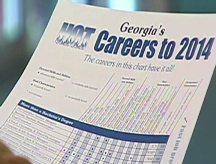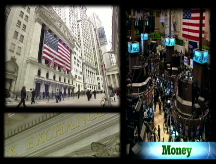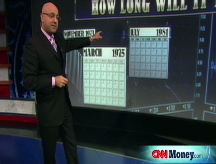Stocks tumble ahead of jobs report
Wall Street retreats on weak economic readings and auto bailout hearing. Friday's employment report looms.

NEW YORK (CNNMoney.com) -- Stocks tumbled Thursday as a rash of job cuts at major companies added to jitters ahead of the November jobs report.
The Dow Jones industrial average (INDU) ended down 215 points, recovering from a decline of as much as 332 points earlier in the afternoon. The Standard & Poor's 500 (SPX) index fell 2.9% and the Nasdaq composite (COMP) retreated 3.1%.
Stocks seesawed through the morning, but turned lower in the last hour of the session. Wall Street has been reversing direction fairly regularly in the last hour of trading each day.
"It's the 3 o'clock shuffle," said Joseph Saluzzi, co-head of equity trading at Themis Trading.
He said that with the uncertainty about the automakers and the worry about the November jobs report due Friday, investors would rather back out of stocks.
Executives from GM, Ford Motor and Chrysler testified before a Senate panel in an effort to get a $34 billion aid package from Congress. They speak before a House panel Friday.
Oil prices at an almost 4-year low and a selloff in gold and other metals kept the global recession in focus and added to the stock selling, Saluzzi said.
While the recession hasn't seen its turning point yet, the stock market is trying to bottom, said Will Hepburn, president and chief investment officer at Hepburn Capital Management
"The government has put a lot of money to work, and at some point that money will come back into the economy and stock market," Hepburn said.
The problem in the short term, he said, is that between hedge fund redemptions and tax-loss selling, investors are going to want to sell into rallies through year-end.
"These are bear market spikes and they're painful for people because they fizzle out quickly," Saluzzi said.
Research firm TrimTabs estimates that hedge fund redemptions between September and year-end will likely reach $250 billion.
Jobs: On Friday, the government is expected to report that employers cut 325,000 non-farm jobs from their payrolls in November after cutting 240,000 in the previous month.
The unemployment rate, generated by a separate survey, is expected to have risen to 6.8% from 6.5% in the previous month.
Ahead of that report, a slew of major companies announced more than 20,000 job cuts Thursday.
Among the standouts: AT&T (T, Fortune 500) said it would cut 12,000 jobs, or 4% of its workforce, while DuPont (DD, Fortune 500) said it was cutting 2,500 jobs. Both companies are Dow components. Also, Swiss bank Credit Suisse (CS) said it was cutting 5,300 jobs, or about 11% of its workforce, in the U.S. and globally.
A trio of financial services firms announced 3,000 job cuts Wednesday.
Also on Wednesday, payroll-processing firm ADP said 250,000 private sector jobs were cut.
In other employment news, the number of Americans filing new claims for unemployment benefits last week dipped to 509,000 from a revised 530,000 the previous week. Economists surveyed by Briefing.com expected jobless claims of 540,000.
Automakers: The Big Three automakers began two days of testimony on Capitol Hill, pleading for a bailout after being rebuffed last month.
On Tuesday, GM (GM, Fortune 500), Ford Motor (F, Fortune 500) and Chrysler each submitted their turnaround plans to Congress. The automakers are looking to receive a combined $34 billion in aid versus the initially requested $25 billion. Early reports say Congress is unlikely to grant their requests.
The Senate Banking Committee held its hearing Thursday, while the House Financial Services Committee will hold its hearing Friday. (Full story)
Retailers: Wal-Mart Stores (WMT, Fortune 500) continued to outperform the overall retail sector as consumers sought bargains amid the economic crisis. Wal-Mart reported a 3.4% rise in November same-store sales, or sales at stores open a year or more. That was above the company's growth forecast of 1% to 3%.
But other chains had a rougher period. Sales at Wal-Mart rival Target (TGT, Fortune 500) fell 10.4%, department store chain Nordstrom (JWN, Fortune 500)'s sales fell 15.9% and teen clothing chain Abercrombie & Fitch (ANF)'s sales fell 28%. (Full story)
Oil and metal stocks slipped with the raw commodities. Dow stocks Exxon Mobil (XOM, Fortune 500), Chevron (CVX, Fortune 500) and Alcoa (AA, Fortune 500) all declined.
Market breadth was negative. On the New York Stock Exchange, decliners beat advancers by nearly three to one on volume of 1.47 billion shares. On the Nasdaq, losers topped winners by five to two on volume of 2.10 billion shares.
Other economic news: A report showed that October factory orders fell 5.1% after declining a revised 2.5% in September. Economists thought orders would fall 4.5%.
Federal Reserve Chairman Ben Bernanke said Thursday that the housing market is the key to the economic recovery and that the government has to do more to deal with foreclosures.
Bonds: Treasury prices rallied, lowering the yield on the benchmark 10-year note to 2.56% from 2.66% late Wednesday. The 10-year yield dipped below 3% last week for the first time since the note was first issued in 1962. Treasury prices and yields move in opposite directions.
The yield on the 3-month Treasury bill inched up to 0.02% from 0.01% Wednesday, but still near the 68-year low of zero hit last month. The 3-month is seen as the safest place to put money in the short term. A low yield means wary investors would rather preserve cash despite earning little or no interest on it than risk the stock market.
Lending rates eased. The 3-month Libor rate slipped to 2.19% from 2.20% Wednesday, while overnight Libor fell to 0.52% from 0.88% Wednesday, according to Bloomberg. Libor is a key bank lending rate.
Other markets: In global trading, Asian markets ended lower. European markets ended lower, erasing earlier gains after the European Central Bank, the Bank of England and Sweden's Riksbank all lowered rates. (Full story)
The dollar gained versus the euro and fell against the yen.
U.S. light crude oil for January delivery fell $3.12 to settle at $43.67 a barrel on the New York Mercantile Exchange, ending at a nearly 4-year low.
COMEX gold for February delivery lost $5 to settle at $765.50 an ounce.
Gasoline continued its fall to nearly four-year lows, with prices down 1.4 cents to a national average of $1.789 a gallon, according to a survey of credit-card swipes released Thursday by motorist group AAA. Prices have been sliding for 2-1/2 months and have dropped more than $2 a gallon, or 53%. ![]()





